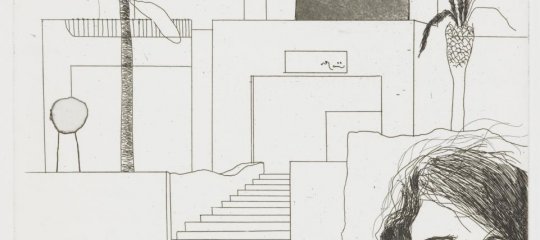On the emergence of memory
Κυριακή Φραντζή
12 Δεκεμβρίου 2007
On the emergence of memory, μην το κλείνεις έχει κι άλλο τετράδιο, αυτό που αρχίζει μια μέρα που περπάτησες περπατάς γύρω μακριά από και χωρίς χάρτη έτσι απλώς περπατώντας και κοιτάζοντας ένα παγκάκι που θα μπορούσες να κάθεσαι μερικά πρωινά, σπίτια με κήπους ζωγραφιστούς μικρά βουδιστικά αγάλματα, γλάστρες με φυτά διαφόρων ιδίως εκείνα τα κρεμαστά άσπρα που περιέργως δε μυρίζουν καθόλου, εγκυμονούν αέρα απίστευτα λεπτά πέταλα μεγάλα λοχμωτά φύλλα κορμοί χωρίς φύλλα χοντροί και σπίτια με κουρτινάκια νάυλον αυτά τα παλιά που τόσο καλά ήξερες, αυτά εδώ όμως όχι, επειδή οι πόλεις έχουν τόσα πολλά και περνάς κάθε μέρα δίπλα τους χωρίς να τα βλέπεις επειδή στο μυαλό σου ο Chris που καθόλου δε σκέφτεσαι είναι εκεί όμως μεταξύ τραχείας και φάρυγγος μικράς και μεγάλης κοιλίας στο στήθος ψηλά στην πλάτη ενώ τριγύρω μεγαλώνουν τα φύλλα, beware warning μια ακακία σαν παρουσία με ή χωρίς ψεγάδια, κατηφοριές έξαφνες και κρυφά δρομάκια που πίστευες ότι μόνο στην Ευρώπη υπάρχουν, είναι κι εδώ όμως, κοιμούνται και ξυπνάνε και ζουν την τσιμεντένια ζωή τους κάθε μέρα ενώ εσύ δεν τα βλέπεις και nightshades day shades όπου μπορείς να καθήσεις χωρίς να σε βλέπει κανένας κοιτώντας απλώς μέσα και γύρω, μια μέσα μια γύρω, ώσπου συμβαίνει αυτό που λέγεται integration, it may have something to do with integrity who cares, ξαφνικά η αναπνοή κυλάει ελευθερώνεται, εκεί που πριν δεν ακουγόταν καθόλου, έλεγες πάει ο άνθρωπος έμεινε έμεινα στον τόπο, αλλά όχι παίρνει ανάσα βαθιά και ανοίγει τα μάτια, τα μάτια των γερόντων καθαρά σαν παιδιά μετά τον ύπνο, και σε βλέπει να κοιτάζεις έξω από το παράθυρο καθιστή με ίσια την πλάτη την κορφή ενός δέντρου
Κάπως έτσι πεθαίνουμε και ξαναζούμε, για να υποσχεθούμε ότι αύριο, μεθαύριο, τις επόμενες μέρες εξάπαντος θα βρούμε έναν τρόπο να περπατήσουμε σ' αυτό που ήταν η θέα του σπιτιού μας τόσα χρόνια, τη σχεδιάσαμε νοερά με ελιές και να οδηγεί στη θάλασσα, μπορεί ναι μπορεί όχι καράβια, ήταν καλοκαίρι και κοιμόμαστε με την ποια;-δε θυμάμαι! στο πάνω πάτωμα και η ερώτηση ήταν τι βλέπεις μπροστά;
Βλέπω έναν κάμπο με ελιές πυκνά δέντρα πράσινα να βγάζουν στη θάλασσα και τρέχω, τρέχω μέσα απ' τα δέντρα ώσπου φτάνω στην άμμο κι από κει μπαίνω στη θάλασσα αλλά κατά βάθος δεν είναι αυτό, ο ήλιος είναι και η τρεχάλα, κι είμαι παιδί, ένα μικρό αγόρι οπωσδήποτε, κορίτσι με οργαντίνα δε θυμάμαι.
- Εμείς /
- Εισέλθετε στο σύστημα για να υποβάλετε σχόλια










